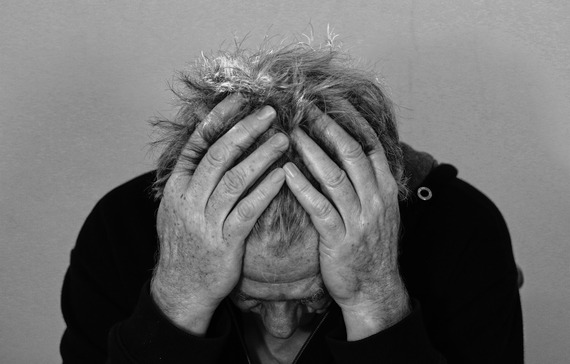For a little over a year now, I've listened to strangers I meet on Craigslist tell me stories they've never told anyone before. I've interviewed someone who went through gender reassignment surgery and was falling in love for the very first time, as his true self. I've spoken with a man who had lost his wife to alcoholism and was struggling to rebuild his life without her. I cried when I spoke to a veteran who had lost both of his legs after serving two tours of combat abroad. My body shook with anger as I heard the confession of a father who had sexually abused his two daughters when they were young girls. I've heard stories about sexual abuse and mental illness, divorce and death, addiction and disability -- stories that have left me in awe at the breadth and depth of humanity.
Before I did this, I worked as a lawyer and, later, as a lobbyist out of a tiny office in downtown Washington, DC. Now my "job" is to listen when no one else will. I do it for free.
In my old life, I stressed out over deadlines, client meetings, unanswered e-mails, and office politics. I purposefully distracted myself with daily minutiae so as not to let my unhappiness fully settle in.
I'd always wanted to have a job where I helped people. But somewhere along the way, I had gotten sidetracked. Each day on my way to work, I passed at least five homeless people, and reminded myself: You have nothing to complain about. You have it good.
One of the homeless men I saw every day was Joe. He stood in front of my building with a paper cup, wearing a black tattered shirt. Whenever I could, I brought him boxed lunches that I'd pick up during Capitol Hill briefings and got him the occasional snack or drink.
"Are you upset with me?" he asked one day, wondering why I'd rounded the corner lunch-less.
The truth was that I was broke. He looked sad as I recited the explanation I'd rehearsed. I blinked back tears and asked if it was all right to spend time with him and talk that day.
As we stood together, I asked him about how he'd become homeless. Did he have any family? Where did he stay when the weather was bad? Did he often go hungry? He answered my questions with intense detail, often stumbling over his words.
Then he asked me about my job and my life. I surprised myself with what I shared--thoughts that had, until then, seemed so personal and devastating, but paled in comparison to Joe's everyday struggle. But he listened patiently, seeming grateful to have someone to talk to. As I watched Joe shake his cup of change at passersby, I understood why. Sometimes people shot him dirty looks. But mostly people completely ignored him: no friendly smiles, no inquisitive glances. He was invisible.
It felt like an injustice for me to ignore him, too. I could no longer walk past him everyday to do a job I didn't really believe in. That night, my partner and I talked about whether we could swing living on just his salary for one year. We did the math, and I put my loans on deferment and applied for a credit card. The next day, I quit.
Joe was just one person I had listened to. For the previous few months, I'd been meeting with strangers I found through an ad on Craigslist--offering them anonymity, a cup of coffee, and a friendly ear. I wanted to try to do this full-time. I thought there were probably a lot of people out there like Joe who didn't have an outlet where they could speak honestly and without restraint--where they could truly be seen as themselves.
My first meeting was at a Starbucks. I sat there for a half hour, nervously picking at my nail polish and becoming more convinced by the minute that the woman who'd emailed me wouldn't show. Then I spotted her across the street, walking hurriedly, looking just as anxious as I felt.
Together we walked to a nearby park, where she told me about her two-decade-long struggle with heroin addiction and the toll it had taken on her life, marriage and children. It was surreal. I kept expecting to see all that she'd gone through written somewhere on her body. But physically she betrayed nothing. Her scarred arms were carefully hidden under long sleeves. Her nails were manicured; her hair perfectly coiffed.
At the end of our meeting, I offered to walk her to her metro stop. She pointed out street corners where she'd scored smack many moons ago. On our way to the station, we walked past Joe. He was standing in his usual spot, rhythmically shaking his cup of change. She walked by him, unfazed.
When I got home that day, I responded to more emails--and then I kept going. I meet people in person or speak with them over the phone about anything they wish to share. For many, it's the first time they've been able to recount their stories without fear of stigma or ostracism. "I've never uttered any of this out loud," people say, or, "I haven't even told my therapist (or best friend, or family, or partner) about this."
I hope that by listening to strangers' stories, I can give the people I meet some perspective and catharsis. But even as I absorb the secrets of others, I have yet to tell my parents what I do every day. I know they'll worry--not just about my safety, but also about my future.
Part of me understands why. When we moved to this country, we were dirt poor. I slept on a futon in the living room of our one-bedroom apartment from age eleven to eighteen. My mom--a former doctor--started cleaning houses to keep us afloat. On the weekends, I tagged along and helped her. We would stop at Dunkin' Donuts, grab two medium coffees, share an egg and cheese croissant, and drive our beat-up 1985 Ford Tempo up the long driveways of Connecticut mansions.
"This is why you have to study hard. This is why we came to this country," my mother would say as we busied ourselves washing, dusting, vacuuming, making beds, and taking out the trash. I often came home from school and saw my mother crying. "Don't worry, mamma. It will all be okay," I would say, holding her chapped hands and feeling the weight of my parents' sacrifices.
"Do you think we'll ever have a house of our own?" she'd ask every now and again, usually as she was scrubbing ferociously, elbow-deep in someone else's bathtub.
"Of course, mamma," I'd say, planning out the future in my mind. When I grew up, I would get my parents their own little house. I would make sure my mom never cried again and that my dad never stressed over bills. I would justify everything they'd gone through.
But when I finally did "make it" as a lawyer, I didn't know which loan or bill to pay off first. I worked long hours and I barely got to see my parents at all. Our nightly phone calls became shorter and shorter. Still, I sent them photos of my office that they shared with anyone and everyone, beaming with pride over their only daughter.
One day, my parents called me from the road. "We are coming to visit you for your birthday," they chirped. "We're on our way already!"
"But I have to work. I have a busy week," I said, trying to explain the demands of my job. Eventually I gave up: I'd have to take the day off.
When they arrived, they insisted on seeing the building where I worked. I took them inside the lobby and introduced them to the guards. They looked small and out of place, and my mom's eyes welled up with tears.
"We are so proud of you, Helena," my mom said. "You must be so happy here. Take a photo of us!"
When I look at the snapshot of my parents grinning ear to ear in front of the building I hated going inside every day, I think about how much I hid from them. I couldn't tell them how unhappy I was because I didn't want to ruin their joy over my accomplishments.
Inside, I was filled with anxieties shared by many first-generation immigrants and people my age. I felt that practical choices and financial stability were more important than taking risks and doing work that I valued and loved. For a long time, it was more important to me to help my parents financially than it was to feel fulfilled in my work.
The unhappier I became, the more I searched in others' faces for a glimpse of my own feelings. But I only saw the well-guarded facades of people who had been taught the same things I had: be ambitious, be successful, be happy, be tough.
Back then, I felt lonely and alienated. But then I met with Joe and hundreds of others from Craigslist, who taught me that we all struggle with something. We all need someone to listen and tell us we're not alone.
Almost a year after I started this project, I walked into an Au Bon Pain a block away from the building where it all started--where my parents had beamed with pride, where Joe had stood in his tattered shirt, and where I had spent so much time being unhappy. I ordered my coffee and sat down to wait for Max, the gentleman I had met a few weeks into the project whose wife had died from complications related to alcoholism. We had stayed in touch over the last year, and I'd suggested that we meet to catch up.
As I sipped on my coffee, I reflected on the last year and how much had changed. I now had no office, no salary, no co-workers, and no schedule. Most days, I worked from my kitchen table or local coffee shop. My colleagues were strangers with secrets. My schedule was busier than it had ever been. And I felt truly happy with how I spent every day. I woke up looking forward to my unconventional job.
When Max walked in, he looked different--younger than he had when I first met him. I hugged him, feeling strangely emotional.
"You look good!" I exclaimed.
"I feel good!" he said, plopping down on his seat.
We talked for an hour about his life in the last year--how hard it had been to donate his wife's things to Goodwill; his plan to sell their house and move to his dream city. Then he paused.
"When I first met you, I was reeling from my wife's death," he said. "I had seen therapists and gone to all sorts of meetings, but something was different about talking to you. I think it's because with others, I worked with my head. But with you, I worked with my heart."
When Max and I said our goodbyes, I walked past my old building towards the metro station. Almost instinctively, I looked for Joe. He wasn't there. I hope more than anything that he's gotten off the streets and reunited with his family. But if I had seen him, I would have thanked him for listening to me when I needed it most. The unexpected kindness he showed me made all the difference.
© 2015 Helena Bala, as first published in Quartz.

